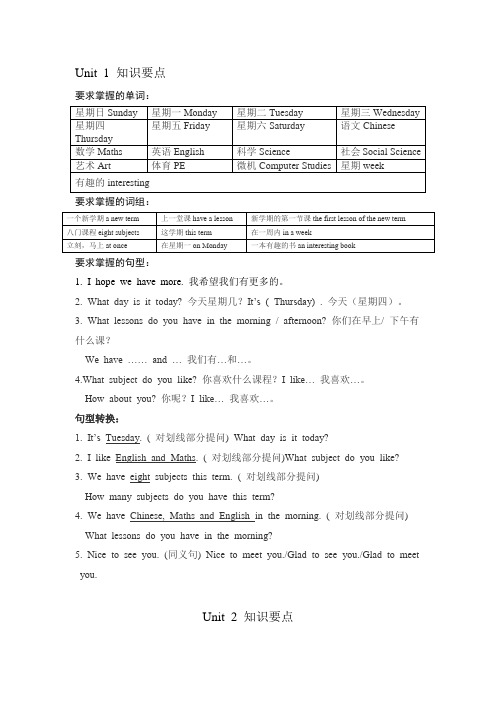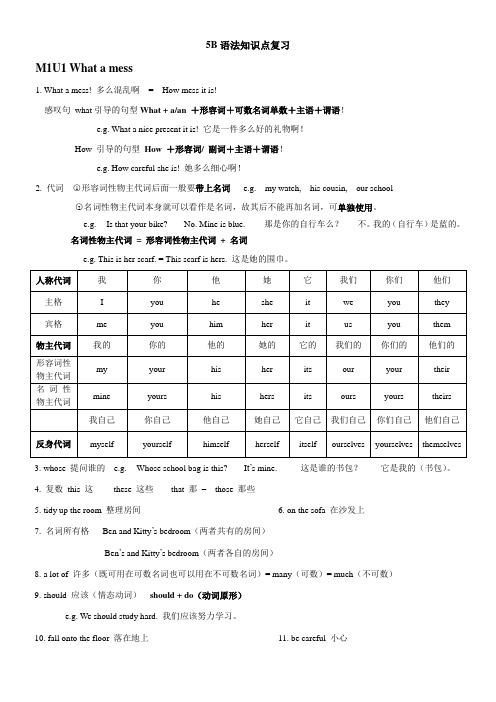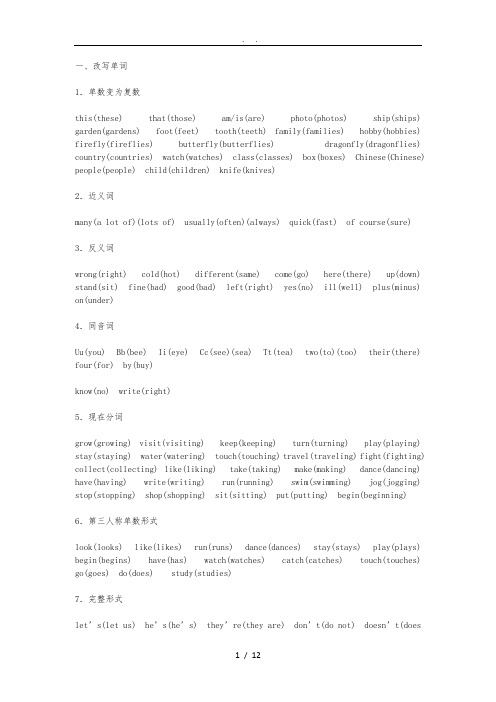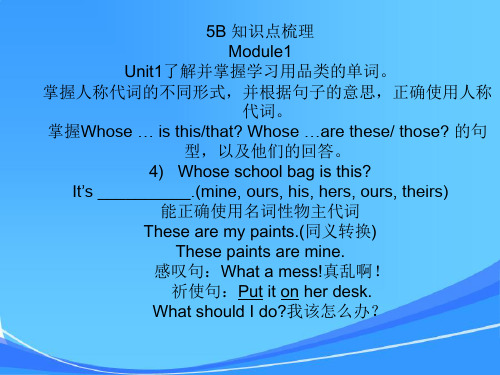牛津小学英语5B单元复习资料
牛津译林版英语5B五年级下学期全册复习资料

5BUnit 1 Cinderella单词prince 王子fairy 仙女why 为什么because 因为clothes 衣服let 让put on 穿上before 在……以前try on 试穿have to 不得不;必须fit 合适,合身take off 脱下mushroom 蘑菇late 迟的,晚的understand 明白,理解pick 摘,拾be bad for 有害的leave ... behind 留下,丢下重点词组1.at the prince’s house 在王子的房子2.so sad 如此伤心3.go to the party 参加舞会4.visit every house 拜访每一间屋子e back 回来6.have a good time 过得愉快7.at the party 在聚会8.take off 脱下9.try on 试穿10.have to go必须走11.leave…behind留下,丢下12.in the forest 在深林里13.under a tree在一棵树下14.pick a big red mushroom摘一个大红色的蘑菇15.look so nice 看起来很漂亮16.be bad for us 对我们有害的17.Money King 美猴王18.read a story about ... 读一个有关……的故事19.be at school 在学校学习重点句型1. Come and help me. 过来帮我。
2. Why are you so sad, dear? 亲爱的,为什么你这样伤心?3. Because I don’t have any nice clothes or shoes. 因为我没有任何漂亮的衣服和鞋子。
4. Hurry up! 快点!5. We can eat them. 我们可以吃它们了。
6. What a pity! 真可惜!7. Why can’t you go to the party? 你为什么不能去参加舞会?8. My foot hurts! 我的脚受伤了!9. I like reading stories about the Monkey King and Nezha.我喜欢读猴王和哪吒的故事。
牛津小学英语5B复习提纲

牛津小学英语5B复习提纲(语法部分)1.用祈使句布置任务:Put…on / in / under…Touch…with…Do…times.Show us…Let’s…Turn…2.一般现在时:A.表示经常性或习惯性的动作、状态、性能,常与always, often, usually, sometimes, every morning, every day, on Sunday等时间状语连用。
eg: He likes music very much.B.表示普遍真理或客观事实:eg: The sun rises in the east.(太阳从东边升起。
)3.一般现在时的构成:一般现在时用动词原形表示,当主语为第三人称单数时,行为动词原形要加-s或-es,have变has。
eg:He does some exercise every morning.My grandma has breakfast at 7 o’clock.注意:如果是辅音字母加y结尾的词应变y为i加-esfly-flies cry-cries study-studies一般现在时的否定句、疑问句,要使用助动词。
第三人称单数用does,动词还原原形;其余情况用do。
eg:They come from Japan.They don’t come from Japan.Do they come from Japan?Yes, they do.The cat watches TV every day.The cat doesn’t watch TV every day.Does the cat watch TV every day.No, it doesn’t.3. 动名词:动名词与现在分词词形一样,均由动词+ing构成。
动名词具有名词特征,在句中可作主语、宾语、表语和定语。
Collecting stamps is one of his hobbies. 作主语He likes watching football matches. 作宾语My favourite sport is fishing. 作表语He’s in the reading room. 作定语动名词的构成:①一般情况,在动词原形后加-ing。
牛津小学英语5B_期末复习资料

Unit 1 知识要点要求掌握的单词:要求掌握的词组:要求掌握的句型:1. I hope we have more. 我希望我们有更多的。
2. What day is it today? 今天星期几?It’s ( Thursday) . 今天(星期四)。
3. What lessons do you have in the morning / afternoon? 你们在早上/ 下午有什么课?We have …… and …我们有…和…。
4.What subject do you like? 你喜欢什么课程?I like…我喜欢…。
How about you? 你呢?I like…我喜欢…。
句型转换:1. It’s Tuesday. ( 对划线部分提问) What day is it today?2. I like English and Maths. ( 对划线部分提问)What subject do you like?3. We have eight subjects this term. ( 对划线部分提问)How many subjects do you have this term?4. We have Chinese, Maths and English in the morning. ( 对划线部分提问) What lessons do you have in the morning?5. Nice to see you. (同义句) Nice to meet you./Glad to see you./Glad to meet you.Unit 2 知识要点要求掌握的单词:要求掌握的词组:要求掌握的句型:1. Why are you absent today?你今天为什么缺席?(相当于Why are you not here today?)2. See you soon. 一会见。
2021 2021学年牛津译林版5B英语全册复习资料

2021 2021学年牛津译林版5B英语全册复习资料----049dc786-6ea1-11ec-aa54-7cb59b590d7d2021-2021学年牛津译林版5b英语全册复习资料牛津伊林苏教育版小学英语五年级第二卷(新版)梳理了整卷的知识点5bunit1cinderella一、单词:remember记住mushroom蘑菇prince王子clothes服装fairy仙女pick采摘question问题hurt受伤why为什么because因为puton穿上late迟的takeoff脱下before在…以前bebadfor有害的party聚会leave…behind留下,help帮助丢下二、词组:1.attheprince’shouse在王子的宫殿2.sosad如此伤心5.参观每家每户6个童话故事7.monkeyking美猴王8.findsomemushrooms找到一些蘑菇9.drawadress画一条连衣裙10.forherfriend为她的朋友11.吃零食吃零食12.吃零食,喝一杯13.fitwell很合适14.looksonice看起来那么漂亮15.不明白understand理解let让fit合身haveto不得不,必须tryon试穿16.wouldliketodo想要做某事17.Bebadborus对我们有害18.脱鞋19.gototheparty参加舞会20.threefairies三个仙女21.试着穿22号哈维多哥不得不走了23.beforetwelveo’clock在12点以前24.attheparties在那些聚会上25.漂亮的衣服26.很多蘑菇27.underthetree在树下28.tryontheshoe试穿鞋子29.吃了它30.找到那个女孩31.whycan’tyou…你为什么不能…32.leave…behind丢下…33.Hurryup 34找到一些饮料找到一些饮料35.somequestionwords一些疑问词36.fitme适合我37.给我画一幅画38.哈瓦德里克喝一杯39.looksonice看起来那么漂亮40.beatschool在校学习41.读一篇关于42.pickabigandredmushroom采一个又大又红的蘑菇三、句子:2.亲爱的,你为什么这么说?亲爱的,你为什么这么伤心?3.becauseidon’thaveanyniceclothesorshoes.因为我没有任何漂亮的衣服和鞋子。
牛津小学英语5B期末复习材料

牛津小学英语5B期末复习材料一、语法点归纳:1.Like + 动名词如:like swimming2.Like + 名词的复数如:like masks3.go + 动名词如:go climbing4.How many + 名词复数如: how many watches5.different + 名词复数如:different countries6.Same 前加the , 后面一般跟单数,如: the same hobby7.序数词前一定加the ,如:the first day8.在几点用 at, 如 at 7 o’clock ,在某一天或某一天的具体时间段用on ,如:on Sunday, on Sunday morning, 直接在早上、下午或晚上用in,如:in the morning 9.动词后代词用宾格(动宾)如:join me10.介词后代词用宾格(介宾)如:with him ,to her11. want to +动原, would like to + 动原, sorry to + 动原,forget to + 动原, it’s time to + 动原,12.情态动词can后面加动原,let 后加动原13.祈使句中动词用原形,否定句在句首加Don’t14.助动词(do does don’t doesn’t)后动词用原形15.形容词加名词(形名)如: a beautiful girl16.动词加副词(动副)如: dance beautifully17.Some 用于肯定句,any 用于否定句18.There be 结构就近原则如:There is a teacher and some students in the classroom. 19.不可数名词:water coffee tea milk juice bread rice food fruit paper chocolate exercise fish20.乐器前加the, 球类前不加the, (play the 乐器,play 球类)如:play the piano, play football21.Who 当作特殊的第三人称单数二、改写单词1.单数变为复数this(these) that(those) am/is(are) photo(photos) ship(ships) garden(gardens) foot(feet) tooth(teeth)family(families) hobby(hobbies) firefly(fireflies)butterfly(butterflies) dragonfly(dragonflies) country(countries)watch(watches) class(classes) box(boxes) Chinese(Chinese) people(people) child(children) knife(knives)2.近义词many(a lot of)(lots of) usually(often)(always) quick(fast) of course(sure) 3.反义词wrong(right) cold(hot) different(same) come(go) here(there) up(down) stand(sit) fine(bad) good(bad) left(right) yes(no) ill(well) plus(minus)on(under)4.同音词Uu(you) Bb(bee) Ii(eye) Cc(see)(sea) Tt(tea) two(to)(too) their(there) four(for) by(buy) know(no) write(right)5.现在分词1、grow(growing) visit(visiting) keep(keeping) turn(turning) play(playing) stay(staying)water(watering)touch(touching)travel(traveling) collect(collecting)2、like(liking)take(taking) make(making)dance(dancing)have(having)write(writing)3、run(running)swim(swimming)jog(jogging)stop(stopping)shop(shopping)sit(sitting) put(putting) begin(beginning)6.第三人称单数形式look(looks) like(likes) run(runs) dance(dances) stay(stays) play(plays) begin(begins) have(has) watch(watches) catch(catches) touch(touches) go(goes) do(does) study(studies)7.完整形式let’s(let us)he’s(he’s)they’re(they are)don’t(do not)doesn’t(does not) I’ve(I have) can’t(can not)8.名词所有格Ben(Ben’s)Mike(Mike’s) Su Yang(Su Yang’s)Helen(Helen’s)9.主格his(he) her(she) me(I) them(they) your(you) us(we)10.宾格she(her) he(him) I(me) you(you) they(them) we(us) it(it)三、翻译词组1在周一上午(on Monday morning) 2读英语(read English)3上一节美术课(have an Art lesson) 4一节有趣的课(an interesting lesson)5上更多的课(have more lesson) 6每天(every day) 7马上(at once)8午饭后(after lunch) 9感到很热(feel hot) 10重感冒(a bad cold) 11.休息(have a rest) 12看医生(see a doctor) 13吃一些药(take some medicine) 14感到好些了(feel better) 15在周三(on Wednesday)16星期四下午(Thursday afternoon) 17七门科目(seven subjects)18在一周内(in a week) 19对…说话(speak to…)20打电话给我(call me) 21患了咳嗽(get a cough)22怎么了(what’s wrong) 23在学校(at school)24呆在床上(stay in bed ) 25错误号码(wrong number )26拍照(take photos ) 27集邮(collect stamps)28一位老同学(an old classmate) 29一艘轮船(a ship )30购物(go shopping) 31种树(grow the trees)32听音乐(listen to music) 33出示…给…(show to… )34看一看(have a look) 35养金鱼(keep goldfish)36一封邮件(an e-mail) 37同龄(the same age)38在一个小镇上(in a small town) 39一封给我姐姐的信(a letter to my sister) 40居住(live in) 41小房子(a small house) 42从…到…(from…to…)43安静地坐(sit quietly) 44在我家附近(near my home)45做衣服(make clothes) 46上学(go to school) 47放学后(after school)48做运动(do sports) 49一张动物邮票(an animal stamp) 50拍照(take photos) 51养狗(keep dogs) 52相同的爱好(the same hobby)53写歌曲(write music) 54上网(surf the Internet)55足球踢得好(play football well) 56快速地停(stop quickly )57在每周六(on every Saturday) 58读报(read newspaper)59浇花(water flowers) 60打乒乓球(play table tennis)61弹钢琴(play the piano) 62照看(look after)63仔细听(listen carefully) 64抬起你的右腿(lift up your right leg)65向左转十次(turn left ten times) 66上下跳两次(jump up and down two times) 67把他们移到教室(move them to the classroom) 68站成四排(stand in four lines) 69发出命令(give orders) 70把你的手放在一起(put your hands together) 71弯曲你的膝盖(bend your knees) 72做一些早锻炼(do some morning exercise) 73在他的背上(on his back) 74在体育课上(at a PE lesson)75在体育馆里(in the sports hall) 76碰你的手臂(touch your arm)77抬起(lift up) 78仰躺(lie on one’s back)79做家庭作业(do one’s homework) 80做家务(do housework)81刷牙(brush teeth) 82洗脸(wash face) 83值日(on duty )84在八点半(at half past eight) 85十点三刻(a quarter to eleven)86让我们快点(let’s hurry) 87忙碌的一天(a busy day)88十点十分(ten past ten) 89没有时间休息(have no time for rest) 90从早到晚(from morning to night) 91吃一些面包(have somebread)92谈论他们的家庭(talk about their family) 93当然(of course)94从书中学到很多(learn a lot from the book) 95搬运一只红色的盒子(carry a red box) 96捉蚂蚁(catch ants) 97去跑步(go running) 98度周末(spend weekends)99团队合作(group work ) 100在夜间发光(glow at night)101英语俱乐部(the English club) 102不同的国家(different countries) 103喜欢旅游(live traveling ) 104一个美国男孩(an American boy)105说法语(speak French) 106长城(the Great Wall)107苏州园林(the gardens in Su Zhou) 108与…交谈(talk to…)109三个中国男孩(three Chinese boys) 110在日本(in Japan)111儿童俱乐部(the Children’s club) 112一位忙碌的参观者(a busy visitor) 113访问澳大利亚(visit Australia) 114一只勇敢的蚂蚁(a brave ant)115一张法国地图(a map of France) 116去爬山(go climbing )117捉昆虫(catch insects) 118游览中国(go around China)119试着…(try to… ) 120在周末(at the weekends)。
牛津小学英语5B单元复习资料

牛津小学英语5B单元复习资料Unit 3 单元知识要点要求掌握的单词:漂亮的beautiful动物(an) animal同班同学classmate爱好hobby收集collect邮票stamp船ship硬币coin要求掌握的词组:拍照take photos去购物go shopping集邮collect stamps集硬币collect coins种花grow flowers养金鱼keep goldfish制作模型船make model ships做衣服make clothes许多漂亮的邮票many beautiful stamps他的同班同学们his classmates集中国邮票collect Chinese stamps煮可口的食物cook nice food种漂亮的花grow beautiful flowers做漂亮的连衣裙make pretty dresses 做一件T恤衫make a T-shirt她的家人her family每天every day浇树和花water the trees and flowers照看,照顾look after同样的爱好the same hobby要求掌握的句子:Do you have any hobbies?你有些爱好吗?Yes, I do. I like …( taking photos) / No, I don’t. 是的,我有。
我喜欢。
(拍照)/ 不,我不喜欢。
He / She likes …( going shopping ).他/ 她喜欢。
(去购物)。
He / She doesn’t like…( growing flowers ).他/ 她不喜欢。
(种花)Ben’s hobby is collecting stamps.本的爱好是集邮。
句型转换:He likes going shopping. (改为一般疑问句,并作否定回答)Does he like going shopping? No, he doesn’t. Ben likes collecting stamps. (改为否定句)Ben doesn’t like collecting stamps.Helen and I like making pretty dresses. (对划线部分提问) What do Helen and you like?My father’s hobby is keeping goldfish. (改为一般疑问句)Is your father’s hobby keeping goldfish?。
牛津英语5B期末知识总复习

第一页,编辑于星期日:三点 四十分。
一、词类
第二页,编辑于星期日:三点 四十分。
1、名词 不可数名词都默认为单数,所以总是用is
各种不同情况
变化方法
一般情况
直接加-s
以s. x. sh. ch结 加-es 尾
以“辅音字母 +y”结尾
以“f或fe”结尾
变y为i, 再加-es 变f或fe为v,再加-es
3、如上述二者都没有,就应用助动词+ not。分四个步骤: (1)肯定陈述句中本来是没有助动词的,要加上去,位置在主语(某人或某物)后,
动词前。 (2)确定助动词用do、does,根据句中动词,动词是原形的助动词就用do,动词
是第三人称单数的助动词就用does
(3)在助动词后加not。
(4)原句中动词假如发生变化就要恢复成原形。 强调一点,有some的要考虑是否要用any。 I am reading this book.
(3)把助动词后提到句首。 (4)原句中动词假如发生变化就要恢复成原形。
强调一点,有some的要考虑是否要用any。 I am reading this book.
I will visit Shanghai Expo next month.
. I think there is some water in the glass
let’s+动词原形 现在进行时:be(am,is,are)+动词ing
第十三页,编辑于星期日:三点 四十分。
I will visit Shanghai Expo next month. I think there is some water in the glass.
第七页,编辑于星期日:三点 四十分。
(word完整版)上海牛津英语5B语法知识点复习,推荐文档

5B语法知识点复习M1U1 What a mess1. What a mess! 多么混乱啊= How mess it is!感叹句what引导的句型What + a/an +形容词+可数名词单数+主语+谓语!e.g. What a nice present it is! 它是一件多么好的礼物啊!How 引导的句型How +形容词/ 副词+主语+谓语!e.g. How careful she is! 她多么细心啊!2. 代词○1形容词性物主代词后面一般要带上名词 e.g. my watch, his cousin, our school○2名词性物主代词本身就可以看作是名词,故其后不能再加名词,可单独使用。
e.g. -- Is that your bike? -- No. Mine is blue. -- 那是你的自行车么?-- 不。
我的(自行车)是蓝的。
名词性物主代词= 形容词性物主代词+ 名词e.g. This is her scarf. = This scarf is hers. 这是她的围巾。
3. whose 提问谁的 e.g. -- Whose school bag is this? -- I t’s mine. -- 这是谁的书包?-- 它是我的(书包)。
4. 复数this 这- these 这些that 那–those 那些5. tidy up the room 整理房间6. on the sofa 在沙发上7. 名词所有格Ben and Kitty’s bedroom(两者共有的房间)Ben’s and Kitty’s bedroom(两者各自的房间)8. a lot of 许多(既可用在可数名词也可以用在不可数名词)= many(可数)= much(不可数)9. should 应该(情态动词)should + do(动词原形)e.g. We should study hard. 我们应该努力学习。
牛津小学英语5B知识点(全)

一、改写单词1.单数变为复数this(these) that(those) am/is(are) photo(photos) ship(ships) garden(gardens) foot(feet) tooth(teeth) family(families) hobby(hobbies) firefly(fireflies) butterfly(butterflies) dragonfly(dragonflies) country(countries) watch(watches) class(classes) box(boxes) Chinese(Chinese) people(people) child(children) knife(knives)2.近义词many(a lot of)(lots of) usually(often)(always) quick(fast) of course(sure)3.反义词wrong(right) cold(hot) different(same) come(go) here(there) up(down) stand(sit) fine(bad) good(bad) left(right) yes(no) ill(well) plus(minus) on(under)4.同音词Uu(you) Bb(bee) Ii(eye) Cc(see)(sea) Tt(tea) two(to)(too) their(there) four(for) by(buy)know(no) write(right)5.现在分词grow(growing) visit(visiting) keep(keeping) turn(turning) play(playing) stay(staying) water(watering) touch(touching) travel(traveling) fight(fighting) collect(collecting) like(liking) take(taking) make(making) dance(dancing) have(having) write(writing) run(running) swim(swimming) jog(jogging) stop(stopping) shop(shopping) sit(sitting) put(putting) begin(beginning)6.第三人称单数形式look(looks) like(likes) run(runs) dance(dances) stay(stays) play(plays) begin(begins) have(has) watch(watches) catch(catches) touch(touches) go(goes) do(does) study(studies)7.完整形式let’s(let us) he’s(he’s) they’re(they are) don’t(do not) doesn’t(doesnot) I’ve(I have) can’t(can not)8.名词所有格Ben(Ben’s)Mike(Mike’s) Su Yang(Su Yang’s) Helen(Helen’s)9.主格his(he) her(she) me(I) them(they) your(you) us(we)10.宾格she(her) he(him) I(me) you(you) they(them) we(us) it(it)二、改写句子1.对画线部分提问It’s half past ten. (What time is it?)The students are in the sprots hall. (Where are the students?)My uncle likes growing flowers. (What does your uncle like doing?)I feel better now. (How do you feel now?)I’ve got a high fever. (What’s wrong with you?)I come from Japan. (Where do you come from?)She is from China. (Where is she from?)The girl in red is my sister. (Which girl is your sister?)Tom comes from the USA.(Who comes from the USA?)2.改为一般疑问句I’m taking some medicine. (Are you taking any medicine?)She feels very tired. (Does she feel tired?)I want to fly a kite. (Do you want to fly a kite?)The boy is standing. (Is the boy standing?)He lives in a small town. (Does he live in a small town?)They can play the piano. (Can they play the piano?)3.改为否定句My mother is taking some medicine. (My mother isn’t taking any medicine.) She can mak e clothes. (She can’t make clothes.)He works from Monday to Friday. (He doesn’t work from Monday to Friday.) They’re buying food in the shop. (they aren’t buying food in the shop.) They play table tennis every day. (They don’t play table tennis every d ay.) That is Jan’s umbrella. (改为同义句)That umbrella is Jan’s.It’s time to have breakfast. (改为同义句)It’s time for breakfast./It’s time for having breakfast.Who is absent today? (改为同义句)Who is not here today?I’m going to the library now. (改为祈使句)Don’t go to the library now.The man puts the plate on his finger. (改为现在进行时)The man is putting the plate on his finger.They are our good friends. (改为单数形式)He is my good friend.They usually do housework on Sundays. (改为单数形式)He usually does housework on Sunday.三、连词成句think, is, today, Saturday, I (.) (I think today is Saturday.) you, can, me, tell (?) (Can you tell me?)I, to, go, China, hope, I, can (.) (I hope I can go to China.) this, subject, you, do, what, like, term (?)(What subject do you like this term?)lesson, it, the, new, the, of, term, is first (.)(It is the first lesson of the new term.)is, stamps, he, showing, to, friends, his, his (.)(He is showing his stamps to his friends.)she, does, making, like, ships, model (?)(Does she like making model ships?)with, what’s, you, wrong (?) (What’s wrong with you?)have, lessons, I, in, four, the, morning (.)(I have four lessons in the morning.)goes, from, he, Friday, to, Monday, school, to (.)(He goes to school from Monday to Friday.)subjects, study, what, he, at, does, school (?)(What subjects do you study at school?)hobby, stamps, is, Ben’s, collecting (.)(Ben’s hobby is collecting stamps.)you, in, what, do, lessons, the have, morning (?)(What lessons do you have in the morning?)you, why, absent, are, today (?) (Why are you absent today?) left, right, Ton, three, turn, times, and (.)(Turn left and right three times, Tom.)you, touch, your, your, head, can, with, hands(?)(Can you touch your head with your hands?)lie, do, on, not, your, back(.)(Do not lie on your back.) putting, the, is man, on, the, apple, finger, his (.)(The man is putting the apple on his finger.)are, the, lesson, students, where, having, a PE (?)(Where are the students having a PE lesson?)fingers, many, does, how, the, have, monkey (?)(How many fingers does the monkey have?)has, a, David, day, busy (.) (David has a busy day.)a, game, basketball, this, there, evening, is (.)(There is a basketball game this evening.)what, it, is, time, now, Ben(?) (What time is it now,Ben?) you, thirsty, feel, do (?) (Do you feel thirsty?)begins, English, at, to, fifteen, our, lesson, ten (.)(Our English lesson begins at fifteen to ten.)like, Mike, does, to, English, speak (?)(Does Mike like to speak English?)same, Tom, are, Jason, From, country, the and (.) (Tom and Jason are from the same country.)are, the, Miss, talking, Wang, students, to (.) (The students are talking to Miss Wang.)want, do, New York, you, go, to, around (?)(Do you want to go around New York?)teaches, he, in, school, English, a, primary (.) (He teaches English in a primary school.)it, today, what, is day(?) (What day is it today?) is, think, interesting, I, English (.)(I think English is very interesting.)us, meet, come, and, here(.)(Come here and meet us.) an, , he, writing, is, his, teacher, to (.)(He is writing an to his teacher.)四、中译英(一)词组1 在周一上午(on Monday morning)2读英语(read English)3上一节美术课(have an Art lesson)4一节有趣的课(an interesting lesson)5上更多的课(have more lesson)6每天(every day)7马上(at once)8午饭后(after lunch)9感到很热(feel hot)10重感冒(a bad cold)11.休息(have a rest)12看医生(see a doctor)13吃一些药(take some medicine)14感到好些了(feel better)15在周三(on Wednesday)16星期四下午(Thursday afternoon)17七门科目(seven subjects)18在一周(in a week)19对…说话(speak to…)20打给我(call me)21患了咳嗽(get a cough)22怎么了(what’s wrong)23在学校(at school)24呆在床上(stay in bed )25错误(wrong number )26拍照(take photos )27集邮(collect stamps)28一位老同学(an old classmate)29一艘轮船(a ship )30购物(go shopping)31种树(grow the trees)32听音乐(listen to music)33出示…给…(show to… )34看一看(have a look)35养金鱼(keep goldfish)36一封(an )37同龄(the same age)38在一个小镇上(in a small town)39一封给我姐姐的信(a letter to my sister) 40居住(live in)41小房子(a small house)42从…到…(from…to…)43安静地坐(sit quietly)44在我家附近(near my home)45做衣服(make clothes)46上学(go to school)47放学后(after school)48做运动(do sports)49一动物邮票(an animal stamp)50拍照(take photos)51养狗(keep dogs)52相同的爱好(the same hobby)53写歌曲(write music)54上网(surf the Internet)55足球踢得好(play football well)56快速地停(stop quickly )57在每周六(on every Saturday)58读报(read newspaper)59浇花(water flowers)60打乒乓球(play table tennis)61弹钢琴(play the piano)62照看(look after)63仔细听(listen carefully)64抬起你的右腿(lift up your right leg)65向左转十次(turn left ten times)66上下跳两次(jump up and down two times)67把他们移到教室(move them to the classroom) 68站成四排(stand in four lines)69发出命令(give orders)70把你的手放在一起(put your hands together) 71弯曲你的膝盖(bend your knees)72做一些早锻炼(do some morning exercise)73在他的背上(on his back)74在体育课上(at a PE lesson)75在体育馆里(in the sports hall)76碰你的手臂(touch your arm)77抬起(lift up)78仰躺(lie on one’s back)79做家庭作业(do one’s homework)80做家务(do housework)81刷牙(brush teeth)82洗脸(wash face)83在八点半(at half past eight)84值日(on duty )85十点三刻(a quarter to eleven)86让我们快点(let’s hurry)87忙碌的一天(a busy day)88十点十分(ten past ten)89没有时间休息(have no time for rest)90从早到晚(from morning to night)91吃一些面包(have somebread)92谈论他们的家庭(talk about their family)93当然(of course)94从书中学到很多(learn a lot from the book) 95搬运一只红色的盒子(carry a red box)96捉蚂蚁(catch ants)97去跑步(go running)98度周末(spend weekends)99团队合作(group work )100在夜间发光(glow at night)101英语俱乐部(the English club)102不同的国家(different countries)103喜欢旅游(live traveling )104一个美国男孩(an American boy)105说法语(speak French)106长城(the Great Wall)107园林(the gardens in Su Zhou)108与…交谈(talk to…)109三个中国男孩(three Chinese boys)110在日本(in Japan)111儿童俱乐部(the Children’s club)112一位忙碌的参观者(a busy visitor)113访问澳大利亚(visit Australia)114一只勇敢的蚂蚁(a brave ant)115一法国地图(a map of France)116去爬山(go climbing )117捉昆虫(catch insects)118游览中国(go around China)119试着…(try to… )120在周末(at the weekends)(二)句子1、小男孩正站在他父亲的肩膀上。
沪教版牛津英语5BM1U1知识点

沪教版牛津英语5BM1U1知识点Unit 1: Let's Learn English1. Greetings and introductions:- Hello! Hi! How are you?- I'm fine, thank you. And you?- Nice to meet you.- What's your name? My name is...- Where are you from? I'm from...2. Classroom objects:- pencil, pen, book, ruler, eraser, pencil case, glue stick, notebook- desk, chair, blackboard, whiteboard, schoolbag3. Numbers 1-10:- one, two, three, four, five, six, seven, eight, nine, ten4. Colors:- red, blue, green, yellow, black, white, orange, purple, pink, brown5. Family members:- grandfather, grandmother, father, mother, brother, sister, baby6. Pronouns:- I, you, he, she, it, we, they7. Possessive pronouns:- my, your, his, her, its, our, their8. Animals:- dog, cat, fish, bird, rabbit, turtle, monkey, lion, elephant, giraffe, tiger9. Places:- home, school, park, supermarket, zoo, library, bank10. Prepositions of place:- in, on, under, behind, in front of, between, next to11. Verb "to be":- I am, you are, he/she/it is, we are, they are- get up, have breakfast, go to school, have lunch, do homework, go to bed- morning, afternoon, evening, night13. Days of the week:- Monday, Tuesday, Wednesday, Thursday, Friday, Saturday, Sunday14. Weather:- sunny, rainy, cloudy, windy, snowy15. Seasons:- spring, summer, autumn/fall, winter16. Clothes:- T-shirt, dress, shorts, skirt, pants, socks, shoes, hat, jacket17. Food and drinks:- apple, banana, orange, milk, water, juice, bread, rice, noodles, pizza18. Things in the kitchen:- stove, oven, refrigerator, sink, table, chair, cupboard19. Transport:- car, bus, bike, train, airplane, boat20. Sports:- tennis, soccer/football, basketball, swimming, cycling, running21. Hobbies and activities:- reading, drawing, playing music, watching TV, playing games22. Emotions:- happy, sad, angry, tired, scared, excited, bored23. Adjectives:- big, small, tall, short, long, fast, slow, beautiful, ugly, smart24. Opposites:- up/down, left/right, in/out, hot/cold, big/small,happy/sad25. Questions and responses:- What...? Where...? When...? Who...? How...?- It's... I'm... He's... She's... They're...- Listen, repeat, open your books, close your books, stand up, sit down27. Days of the week, months, and dates:- first, second, third, fourth, fifth, sixth, seventh, eighth, ninth, tenth- January, February, March, April, May, June, July, August, September, October, November, December28. Money:- yuan, dollar, euro, cent29. Musical instruments:- piano, guitar, violin, drums, flute30. Jobs:- teacher, doctor, nurse, firefighter, police officer, chef, musicianThese are the key points covered in Unit 1 of the Shanghai Oxford English 5B textbook.。
牛津译林小学英语5B词归纳

Unit 1单元知识班级______________________ 姓名_______________________短语1. at the prince’s house 在王子家2. cannot go 不能去3. help me 帮助我4. my gloves 我的手套5. so sad 如此悲伤6. go to the party 去参加晚会7. have a good time 玩得很开心8. at the party 在晚会上9. have to go 不得不去10. visit every house 拜访每一户人家11. many girls 许多女孩12. try on 试穿13. try it on 试穿它14. have a drink 喝饮料15. leave a shoe behind 留下一只鞋16. in the forest 在森林里17. have some snacks 吃一些零食18. find some mushrooms 找到一些蘑菇19. hurry up 快一点20. be bad for…对……有害21. fit well 非常合适22. the Monkey King and Nezha 美猴王和哪吒23. have some nice clothes and shoes 有一些漂亮的衣服和鞋子24. put on the new clothes and shoes 穿上新的衣服和鞋子25. come back before 12 o’clock 在12点之前回来26. like reading fairy tales 喜欢读童话故事27. pick a big red mushroom 捡了一个大的红色的蘑菇句型1. There is a party at the prince’s house. 在王子家有一场晚会。
2. Cinderella, come and help me! 灰姑娘,过来帮我!3. Why are you so sad, dear? 亲爱的,为什么如此难过?4. Because I can’t go to the party. 因为我不能参加晚会。
上海牛津英语5B复习课件

动词原形及过去式:1.watched 2.live—lived
move—moቤተ መጻሕፍቲ ባይዱed 3. play---played enjoy—enjoyed
study--studied
不规则变化:are ----were
am, is------- was
see---saw
eat—ate
buy---bought go---went
2.现在进行时的肯定句基本结构为 be+动词ing. The monkey is swinging. She is cooking dinner . he is doing his homeworknow.
wash-washes, watch-watches, go-goes 3.以“辅音字母+y”结尾, 变y为i, 再加-es,如:study-
studies
现在进行时
1.现在进行时表示现在正在进行或发 生的动作,也可表示当前一段时间内 的活动或现阶段正在进行的动作。He is taking pictures.
2.表示经常性或习惯性的动作。如:I get up at six every day.我每天六 点起床。一般的时间词有:often , sometimes ,everyday ,usually
一般现在时的构成1. be动词:主语 +be(am,is,are)+其它。如: I am a boy.我是一个男孩。He is a student .他是一个学生 2.行为动词:主语+行为动词(+其 它)。如: We study English.我们 学习英语。 当主语为第三人称单数(he, she,it) 时,要在动词后加"-s"或"-es"。如: Mary likes Chinese.玛丽喜欢汉语。
牛津小学英语5B期中复习资料

牛津小学英语5B 期中复习资料牛津小学英语5B 期中复习资料5B单词表Unit 1单词:Monday星期一Tuesday 星期二Wednesday星期三Thursday 星期四Friday 星期五Saturday星期六Sunday星期日subject学科,科目Chinese语文Science 科学interesting有趣的week周,星期clock钟coffee 咖啡doctor 医生hot热的term学期PE体育tell 告诉(人称用宾格)show 出示,给…看Computer Studies 计算机课程welcome欢迎back回(原处)today 今天wish 希望hope希望more更多的March三月about关于,大约minus 减plus 加trick 窍门timetable时间表词组:a new term一个新学期Monday morning星期一早晨have a lesson上一节课Miss Li and her students李老师和她的学生们the first lesson第一节课the new term新学期on Monday在星期一in the morning在早上on Monday morning在星期一早上have an Art lesson 上一节美术课eight subjects八个学科this term 这学期what subject什么学科an interesting story 一个有趣的故事how many lessons 多少节课in a week在一星期里let me see让我看看tell me告诉我at once立刻,马上the hot coffee热咖啡near the clock在钟的附近for the doctor给医生the first lesson of the new term新学期的第一节课Social Science社会科学very much很,非常I hope我希望have more Art lessons上更多的美术课every day 每一天from Sunday to Saturday 从星期日到星期六Nice to see you. 看见你很高兴。
- 1、下载文档前请自行甄别文档内容的完整性,平台不提供额外的编辑、内容补充、找答案等附加服务。
- 2、"仅部分预览"的文档,不可在线预览部分如存在完整性等问题,可反馈申请退款(可完整预览的文档不适用该条件!)。
- 3、如文档侵犯您的权益,请联系客服反馈,我们会尽快为您处理(人工客服工作时间:9:00-18:30)。
Unit 1 单元知识要点要求掌握的单词:星期日Sunday 星期一Monday星期二Tuesday星期三Wednesday星期四Thursday 星期五Friday星期六Saturday语文Chinese数学Maths英语English科学Science社会Social Science艺术Art 体育PE微机ComputerStudies星期week有趣的interesting要求掌握的词组:一个新学期a new term上一堂课have a lesson新学期的第一节课the first lesson of the new term八门课程eight subjects 这学期this term在一周内in a week立刻,马上at once 在星期一on Monday一本有趣的书an interesting book要求掌握的句型:1.I hope we have more.我希望我们有更多的。
2. What day is it today? 今天星期几?It’s ( Thu rsday) . 今天(星期四)。
3. What lessons do you have in the morning / afternoon? 你们在早上/ 下午有什么课?We have …… and …我们有…和…。
4. What subject do you like? 你喜欢什么课程?I like…我喜欢…。
How about you? 你呢?I like…我喜欢…。
句型转换:1.It’s Tuesday. ( 对划线部分提问) What day is it today?2.I like English and Maths. ( 对划线部分提问)What subject do you like?3.We have eight subjects this term. ( 对划线部分提问) How many subjects do you have this term?4.We have Chinese, Maths and English in the morning. ( 对划线部分提问)What lessons do you have in the morning?5.Nice to see you. (同义句) Nice to meet you.Unit 2 单元知识要点要求掌握的单词:要求掌握的词组:要求掌握的句型:1. Why are you absent today? 你今天为什么缺席?(相当于Why are you not here today?)2.See you soon. 一会见。
3. I hope you get better soon. 我希望你尽快好起来。
4. How do you feel now? 你现在觉得怎么样啊?I feel…( tired, hot, thirsty, ill…)我觉得…(累的,热的,渴的,病的)。
I can get a / some … for you. 我能给你一/ 一些…。
5. What’s wrong with you? 你怎么了?(相当于What’s the matter with you?)I’ve got a …( fever, toothache, cold, cough…) 我得了…(发烧,牙痛,感冒,咳嗽…)。
I’m sorry to hear that. 听到这我感到很抱歉。
打电话的常识:如你致电某人,电话接通后,你应对接电话的人说May I speak to …, please?如果你接听电话,而你正是对方想找的人,应说This is… speaking.如果来电的人找的人不在,你应说Sorry, …is not here.无论是你致电他人或他人致电给你,若你想问是谁在接听电话,应说Who’s that, please?Is that…(speaking)?如果你想告诉对方你是谁,应说Thisis ….(speaking).如果有人打错电话,你应说Sorry, wrong number.Unit 3 单元知识要点要求掌握的单词:漂亮的beautiful 动物(an)animal同班同学classmate爱好hobby收集collect 邮票stamp 船ship 硬币coin 要求掌握的词组:拍照take photos去购物go shopping集邮collect stamps集硬币collect coins种花grow flowers养金鱼keep goldfish制作模型船make model ships做衣服make clothes许多漂亮的邮票many beautifulstamps他的同班同学们his classmates 集中国邮票collectChinese stamps煮可口的食物cooknice food种漂亮的花grow beautiful flowers做漂亮的连衣裙make pretty dresses做一件T恤衫makea T-shirt她的家人her family每天every day浇树和花water the trees andflowers照看,照顾look after同样的爱好the same hobby要求掌握的句子:Do you have any hobbies?你有些爱好吗?Yes, I do. I like …( taking photos) / No, I don’t. 是的,我有。
我喜欢。
(拍照)/ 不,我不喜欢。
He / She likes …( going shopping ).他/ 她喜欢。
(去购物)。
He / She doesn’t like… ( growing flowers ).他/ 她不喜欢。
(种花)Ben’s hobby is collecting stamps.本的爱好是集邮。
句型转换:He likes going shopping. (改为一般疑问句,并作否定回答)Does he like going shopping? No, he doesn’t.Ben likes collecting stamps. (改为否定句)Ben doesn’t like collecting stamps.Helen and I like making pretty dresses. (对划线部分提问)What do Helen and you like?My father’s hobby is k eeping goldfish. (改为一般疑问句)Is your father’s hobby keeping goldfish?Unit 4 单元知识要点要求掌握的单词:忙的busy 高地,高的high 镇town通常usually 好地well 电子邮件e-mail英语English 年龄age要求掌握的词组:大声地说话speak loudly舞跳得漂亮dance beautifully跳得高jump high跑得快run fast 静静地坐着sit quietly小心地走walk carefully一位英国朋友an English friend 发一封电子邮件writean e-mail住在伦敦live inLondon同龄the same age一个小镇a small town上网浏览surfthe Internet他的英国朋友his English friend踢得好play well泳游得好swim well从星期一到星期五from Monday toFriday做运动do exercise一封给我的信a letter for me想要want to和…打乒乓play table tennis with学汉语study Chinese要求掌握的句型:I’m busy.我忙的。
We’re the same age.我们是同龄人。
A: Does he / she jump high? 他/ 她跳得高吗?B: Yes, he / she does. 是的,他/ 她是。
No, he / she doesn’t.不,他/ 她不是。
A: What does he / she usually do on Sundays?他通常在星期日做什么?B: He / She usually takes photos. 他通常拍照。
A: What subjects does he study at school? 在学校他学什么课程?B: He studies English, Maths, Science and Art. 他学英语、数学、科学和艺术。
句型转换:1.Helen usually goes shopping on Saturdays. (对划线部分提问)What does Helen usually do on Saturdays?2. Does he jump high? (改为陈述句)He jumps high.3. He runs fast. (改为否定句)He doesn’t run fast.人称代词一般现在时的动词形式一般现在时主要由动词原形表示,但第三人称单数后的动词词尾有所变化。
第三人称单数动词词尾的变化有几种形式:例:I read English every day.You read English every day.We read English every day.They read English every day.Helen and Mike read English every day.My friends read English every day.He reads English every day.She reads English every day.Wang Bing reads English every day.His sister reads English every day.5B Unit 6 知识要点要求掌握的单词要求掌握的词组要求掌握的句子1.站成一排。
Stand in a line.2.让我们做一些运动。
Let’s do some exercise.3.现在请仔细地听。
Now, listen carefully.4.上下跳。
Jump up and down.5.做这个……次。
Do this … times.Do this time times.6.把……放在……上面。
Put… on…Put the pineapple on your head.7.用……触摸…… 多少次touch…with……times Touch your left leg with your right hand three times.5B Unit 7 知识要点要求掌握的单词要求掌握的词组15.步行on foot_ 16. 回家come home___要求掌握的句型1. 几点了?What’s the time? = What time is it?It’s…2. ….的时间到了。
